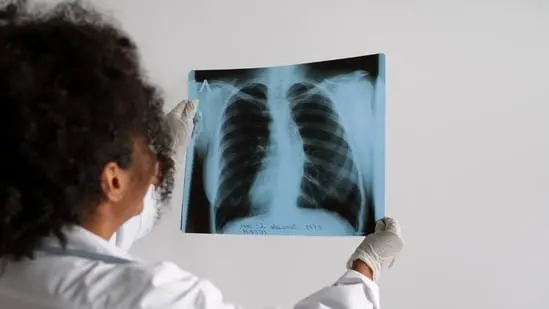
Lung cancer, in the advanced stages, can be fatal. It remains one of the leading causes of cancer-related deaths worldwide because of the absence of prominent symptoms in the early stages. In an interview with HT Lifestyle, Dr. Vikas Mittal, director, pulmonologist at the CK Birla Hospital, Delhi said, “A major reason behind poor survival rates is that many patients are diagnosed at an advanced stage, when treatment options become limited. Early detection is crucial, and this begins with recognising the warning signs that should never be ignored.” Also read | Oncologist says 'persistent back pain' can be early warning sign of lung cancer; shares when you should worry
Red flags of lung cancer:
Dr. Vikas Mittal shared the early warning signs to be aware of:
1. Persistent cough: A cough that lasts longer than two weeks, especially if it does not improve with routine treatment, should raise concern.
2. Coughing up blood (hemoptysis): Even small streaks of blood in spit must be taken seriously.
3. Chest pain: Pain that does not subside with over-the-counter medications and lingers for weeks warrants medical evaluation. Also read | Expert on how quitting tobacco improves health in just 20 minutes to 20 years: ‘Risk of heart disease drops to half’
4. Breathlessness: Any unexplained shortness of breath or wheezing should not be dismissed as just an age or fitness issue.
5. Voice changes: Hoarseness or a whistling sound while breathing could be signs of airway obstruction.
6. Unexplained weight loss and fatigue: Sudden, unintentional weight loss, loss of appetite, and extreme tiredness are common red flags in cancer.
7. Difficulty in swallowing: This can sometimes signal advanced disease that requires urgent attention.

Who should be more cautious?
While anyone can develop lung cancer, certain groups are at higher risk:
- Smokers and ex-smokers
- People exposed to second-hand smoke at home or work
- Those with a family history of cancer
- Individuals living in highly polluted urban areas
Why early detection matters?
“Catching lung cancer in its early stages can be lifesaving. At this point, treatment options such as surgery, targeted therapy, and advanced immunotherapies offer better outcomes and long-term survival. However, once the disease progresses, treatment becomes more complex and less effective.” said Dr Vikas Mittal. Also read | Passive smoking can increase lung cancer risk? Pulmonologist lists 5 ways it can harm your lungs
Note to readers: This article is for informational purposes only and not a substitute for professional medical advice. Always seek the advice of your doctor with any questions about a medical condition.
